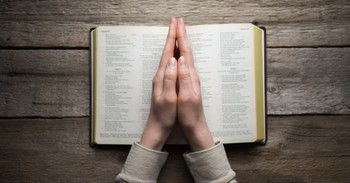The Bible contains many small and sometimes unusual stories that readers often forget or overlook. The characters in these stories are rarely featured in Sunday sermons. Few Bible studies are ever written about them. And yet, the God of the Bible included them in Scripture for a reason. What that reason is, we don’t always know. The story of Achsah, the daughter of Caleb, is one such tale.
As the daughter of Caleb, Achsah was promised to whatever man was bold enough to claim the city of Kiriath-Sepher for the tribe of Judah. Othniel, the son of Caleb’s younger brother, rose to the challenge. However, before Achsah’s marriage, she asked her father to add to her dowry by giving her additional springs in the upper and lower portions of the Negev, the region given her as an inheritance.
On the surface, Achsah’s story may seem relatively obscure and inconsequential. However, several important lessons are to be gleaned from this young woman, her family, and the legacy that lived on through her faith. But who is Achsah, and why should Christians know her story?
Where Does the Bible Mention Achsah?
Achsah, whose name means “anklet” or “ankle bracelet,” is featured in the account of Caleb’s inheritance that is recorded in Joshua 14:6-9 and again in Judges 1:1-15.
Of course, Caleb’s specific inheritance is part of the larger allocation of land given to each of the twelve tribes of Israel following the conquest of Canaan. Here, the inheritance for one of Israel’s greatest heroes and most inspirational leaders is finally administered as a reward for his outspoken, resilient faith in the promises of God (Numbers 13-14).
Not only would Achsah benefit from her father’s blessing, the daughter of one of Israel’s most renowned heroes would follow in her father’s footsteps by seeking favor where it could be given and exercising faith in receiving it.
However, before we truly understand the significance of Achsah’s request, it’s important to look back at her family’s unique history and why her father was so favored amongst the sons of Judah.
Who Was Achsah’s Father?
Caleb, the son of Jephunneh, was one of the original twelve spies chosen to scope out the Promised Land before the Israelites crossed over the Jordan River (Numbers 13:6). When they returned from their initial survey, Caleb and the rest of the spies confirmed to Moses that the land was indeed very good and “flowed with milk and honey” as God had promised (Numbers 13:27). However, the spies also reported that this land was inhabited by “strong people” who lived in “large, fortified cities.” (Numbers 13:28-30).
Ten spies see these people’s might and conclude, “We are not able to go up against the people, because they are too strong for us.” (Numbers 13:31).
They further report that “the land through which we have gone to spy out is a land that devours its inhabitants; and all the people whom we saw in it are people of great stature… and we were like grasshoppers in our own sight, and so we were in their sight” (Numbers 13:32-33).
This news swiftly spread throughout Israel, causing the people to tremble.
Joshua and Caleb, however, had a different spirit and returned with a much different report:
“We should by all means go up and take possession of it, for we will certainly prevail over it… the land which we passed through to spy out is an exceedingly good land. If the Lord is pleased with us, then He will bring us into this land and give it to us—a land which flows with milk and honey. Only do not rebel against the Lord; and do not fear the people of the land, for they will be our prey. Their protection is gone from them, and the Lord is with us; do not fear them.” (Numbers 13:30; 14:6-9)
Despite the optimism and faith of Joshua and Caleb, the people of Israel were overcome by fear and committed to returning to Egypt, abandoning God’s promises and the Promised Land’s blessings altogether.
As a result, God swore that the people of Israel would not inherit the Promised Land. Instead, they would wander the desert until the generation who had refused to enter Canaan died off.
God, however, would honor Joshua and Caleb for their faith and for trusting in His promises (Numbers 14:30, 38; 26:65; 32:12; Deuteronomy 1:36; Joshua 14:8).
“But as for My servant Caleb, because he has had a different spirit and has followed Me fully, I will bring him into the land which he entered, and his descendants shall take possession of it.” (Numbers 14:24)
Over forty years later, Caleb continued to serve the Lord faithfully, and in his old age, he remembered God’s promise as spoken by Moses: “The land on which your foot has walked shall certainly be an inheritance to you and to your children forever, because you have followed the Lord my God fully.” (Joshua 14:9)
Caleb, however, requested that the city of Hebron be given his inheritance as well:
“I am still as strong today as I was on the day Moses sent me; as my strength was then, so my strength is now, for war and for going out and coming in. Now then, give me this hill country about which the Lord spoke on that day, for you heard on that day that Anakim were there, with great fortified cities; perhaps the Lord will be with me, and I will drive them out just as the Lord has spoken.” (Joshua 14:11-12)
Accordingly, Joshua blessed Caleb and granted him Hebron. Hebron was where God first showed Abraham the land he and his family would inherit—where Abraham, Isaac, and Jacob were buried (Joshua 14:13-15).
What Does Achsah Do Before She Gets Married?
After the death of Joshua, the tribe of Judah continued expanding its territory (Genesis 49:8-12; 1 Chronicles 5:1-2). At this time, Caleb promised that anyone who seized the town of Kiriath-Sepher (renamed Debir) would be given his daughter Achsah’s in marriage (Judges 1:12).
This challenge was no small feat and certainly not for the weak or faint of heart. Giants (the descendants of Anak, also called the Anakim) lived in Kiriath-Sepher. Only a man of great courage and skill in battle could attack and take Kiriath-Sepher.
Othniel, the son of Kenaz, Caleb’s younger brother, rose to the challenge, successfully claiming Kiriath-Sepher for Caleb. In doing so, he had proven himself worthy of Achsah’s hand and Caleb’s blessing.
However, before their wedding, Achsah persuaded her husband-to-be to request an additional field from Caleb. She then asked her father, “Give me a blessing, since you have given me the land of the Negev, give me also springs of water” (Judges 1:15).
As the Negev was known for being an arid region, Achsah’s request secured for her family additional fertile land and springs that would benefit them for generations to come. Not surprisingly, Caleb granted his daughter the upper and lower springs as part of her dowry and inheritance (Judges 1:15).
Can We Learn Anything from Achsah’s Story?
On the surface, Achsah’s request may seem fairly straightforward and inconsequential to the story of the Old Testament. However, there are a few important lessons to be learned from each of the major characters in this story.
1. Caleb Teaches His Family to Trust in the Promises of God
Though it is possible to read this story and focus solely on Achsah’s assertiveness, it is important to remember that Achsah’s marital request is contained within the account of her father’s inheritance, which God promised as a reward for Caleb’s faithfulness.
As in many Bible stories, God’s faithfulness outshines even the faithfulness of His devoted servant. It may have taken decades to come to fruition, but like every promise God gives, the Lord was faithful to deliver on His promise to Caleb and his family.
Where others had doubted God and “melted in fear” at the sight of their enemies, Caleb, like Joshua, had “a different spirit,” being one of the few in Israel to remember God and trust in His promises (Numbers 13:30; 14:6-9, 14:24). As a result, God looked to Caleb as one who had “followed the Lord fully” and promised to bless him and his descendants for generations to come (Numbers 14:30, 14:38; 26:65; 32:12; Deuteronomy 1:36). God would remember the one who had remembered Him (Exodus 20:5-6).
After 40 years of waiting, others may have given up on God’s promises. Caleb, however, did not.
Unfortunately, the faith of Caleb stood in stark contrast to the timidity and impatience of the nation. As a result, the children of Israel missed entering the Promised Land. Caleb, however, did not. Where others hesitated, Caleb trusted, acted, and received.
For men like Caleb, trusting in the promises of God meant stepping forward and acting in faith. Having seen the faithfulness of God on numerous occasions, Caleb had learned to do more than remember God’s promises. He dared to claim them. As a result, Joshua blessed Caleb and his family by granting them the city of Hebron . . . as Caleb was bold enough to ask for.
2. Othniel’s Courage and Faithfulness Wins Additional Favor
In issuing the challenge of Kiriath-Sepher, Caleb also set an incredibly high bar for any of his daughter’s would-be suitors. Only a man of incredible courage would dare to attack a city of giants. Only a man of great strength would emerge victorious. In conquering Kiriath-Sepher, Othniel had proven he was both.
Interestingly enough, Caleb’s challenge also served as a test for whatever man would ultimately replace him as his daughter’s protector and provider.
Not coincidentally, there was a time when Caleb was one of the only men in Israel to look upon the giants of Canaan and not tremble. His faith in the promises of God saw an opportunity where others saw defeat.
Who in this generation had a similar heart and spirit? Which young man would seize the opportunity where the previous generation melted in fear? Caleb issued the challenge; Othniel accepted it. A pattern emerges.
In many ways, the courage of Achsah’s eventual husband would also win more than Caleb’s blessing. Not surprisingly, God would later call upon Othniel to lead His people as the first judge of Israel. Being faithful with little, Othniel was later entrusted with more.
3. Achsah Seeks Good Gifts from Her Father
Remarkably, there is one trait that all three characters in Achsah’s story have in common: all three were willing to claim blessings that were there for the taking. God offered a blessing, and they took that all-important first step. For Calen and Othniel, the risk was questioning whether or not God meant what He said or would be true to His word.
Like her father, Achsah sought a blessing where it could be given and wasn’t afraid to ask for more. She wasn’t motivated by selfishness or greed. Rather, she knew that her father delighted in giving good gifts to his children and exercised faith in seeking the gifts he promised (Matthew 7:11).
Where Achsah sought an even better gift from her father, Caleb had previously sought a blessing from God the Father. Why? Because they remembered what their respective fathers had promised, and part of having faith means acting on faith. Their story reminds all that “every good thing given and every perfect gift is from above, coming down from the Father of lights, with whom there is no variation or shifting shadow.” (James 1:17).
God rewards the faithful—because He is faithful above all others, and we can rely on His promises.
Photo Credit: © Getty Images/Mintr

This article is part of our People of Christianity catalog that features the stories, meaning, and significance of well-known people from the Bible and history. Here are some of the most popular articles for knowing important figures in Christianity:
How Did the Apostle Paul Die?
Who are the Nicolaitans in Revelation?
Who Was Deborah in the Bible?
Who Was Moses in the Bible?
King Solomon's Story in the Bible
Who Was Lot's Wife in the Bible?
Who Was Jezebel in the Bible?
Who Was the Prodigal Son?




